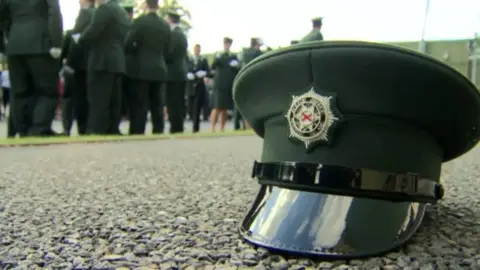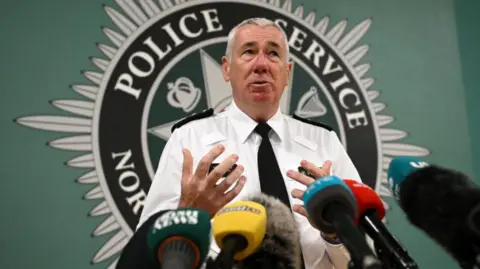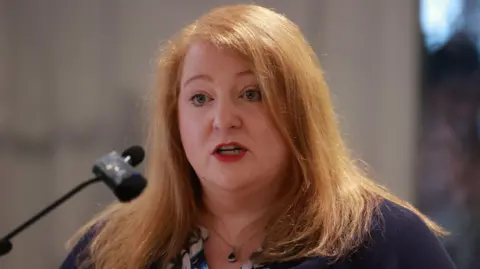PSNI aims to lift all-time low officer levels
 BBC
BBCChief Constable Jon Boutcher has said he will do everything in his power to secure the extra funding required to boost officer numbers to 7,000.
The Police Service of Northern Ireland (PSNI) launched an officer recruitment campaign on Wednesday, aiming to lift numbers from an all-time low.
The £200m required is awaiting Northern Ireland Executive approval.
The PSNI currently has 6,300 officers - the lowest number in its history.
Speaking at the launch of the first recruitment campaign in four years, Mr Boutcher said the service was at "a defining moment".
He added: "It's not a resigning matter if I don't get the money.
"I will do everything in my power, with every breath that I have, to show the arguments as to why we need to be funded to seven thousand officers.
"Anything below that is almost unimaginable."
He recently warned the PSNI was at "a watershed moment" after years of funding problems.
First recruitment in four years
The new campaign will be the first significant drive to recruit trainees since 2021.
They will be offered a starting salary of £34,000, which includes a £4,000 allowance commonly referred to as "danger money".
Recruitment has slowed dramatically in recent years and not kept pace with departures.
Mr Boutcher is pushing ahead with the campaign while awaiting approval for additional money from the Northern Ireland Executive.
 Getty Images
Getty ImagesLast week the PSNI told a committee of MPs that it needed £200m spread over the next five years.
As well as new officers it would pay for 400 more civilian staff.
There has been a long-running debate over police numbers.
The New Decade New Approach deal in 2020 gave a political commitment to the PSNI having 7,500 officers, as envisaged under policing reforms two decades ago.
Last year the PSNI said there was "a compelling case" for 8,500 officers, based on comparisons with other UK police services.
Officer strength is an operational matter for the chief constable.
He pays for them out of his annual budget allocation from the Department of Justice.
Justice Minister Naomi Long said she welcomes the newest recruitment drive, having been previously "extremely concerned" about officer numbers.
 PA Media
PA Media"By not having recruitment over the last couple of years, we've ended up now with exceptionally low police numbers, the lowest we've ever had," she told BBC Radio Ulster's Evening Extra programme.
She said she was "reasonably confident" in receiving additional funding from the executive in order to grow the police force.
"You cannot ask the justice system and the police service to do more and more with less and less indefinitely," she added.
"Something has to give and I think that we've reached the point where we've got to invest to get the numbers back up to where they should always have been."
'Employer of choice'
Mr Boutcher said he wants the PSNI to be seen as an "employer of choice".
He added that those who are recruited "will change lives for the better".
"We must be reflective of the communities we serve if we want our communities to have confidence in us as a police service," he said.
'Steady decline'
SDLP Foyle assembly member and NI Policing Board member Mark H Durkan has said there has been a "steady decline" in police officer numbers over the years which has been "seriously felt in communities".
"The police have become stretched, especially community policing, which has impacted their ability to respond to calls, engage with communities and also victims of crime," he told BBC Radio Foyle's North West Today programme.
"That has had an impact of eroding confidence in policing and undermining how far we have come in policing," he said.
Durkan said he believes any move to increase policing numbers is something that is "backed by all parties" at the Stormont assembly and said "every society needs a fully functioning police service".
He said the police must encourage people from various backgrounds to apply and ensure the PSNI is "more representative of the society it serves".
Recruitment and retention issues
Former senior police officer Jon Burrows said that issues around recruitment and retention mean that it could take five years "before you see the bodies on the ground in terms of larger numbers", rather than three years.
Speaking on BBC Radio Ulster's Good Morning Ulster, he said: "The student officer training programme is 21 week-long, then there's a probationary programme. Prior to that you have exams, scenarios and employment checks so this isn't something that happens overnight."
He said that the £34,000 starting salary is a "significant improvement" and "recognises the work and effort that officers go through and I think that helps".
However, his concern was getting the "right people" to stay in the role.
"We need to make sure we get the right people. We want to keep them when they join. We don't want to lose them after two or three years."
Mr Burrows said that recruiting 550 to 600 officers a year is a "logistical challenge" to be able to cope with.
"It's a competitive field out there," he said.
"There are a lot of jobs out there in the criminal justice area and there's not an infinite pool of people for those and we want the right people."
